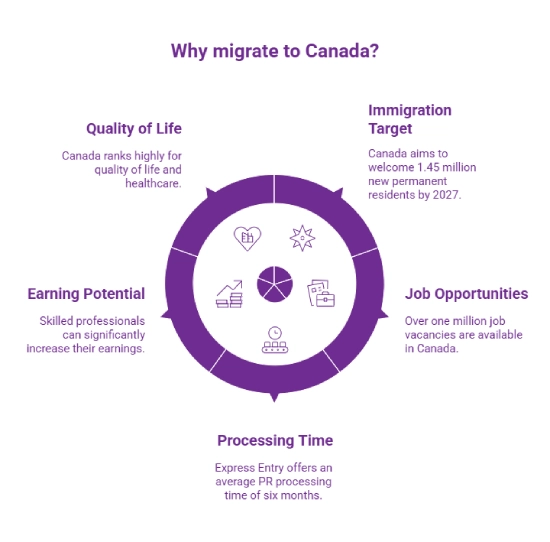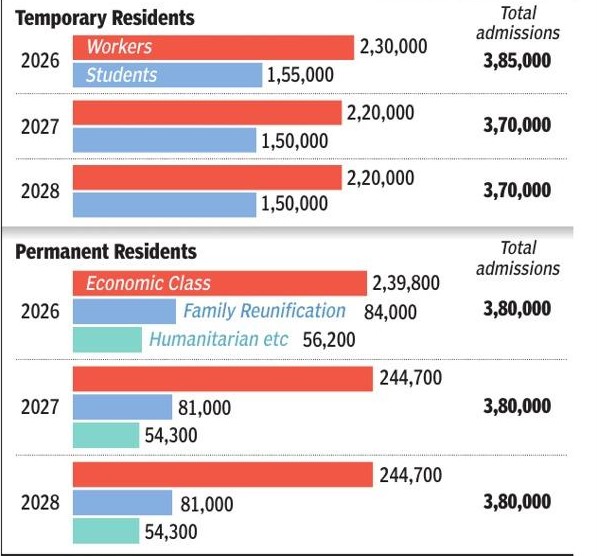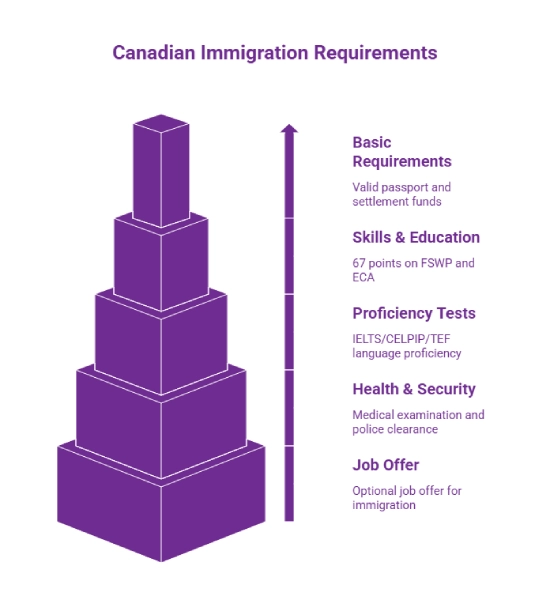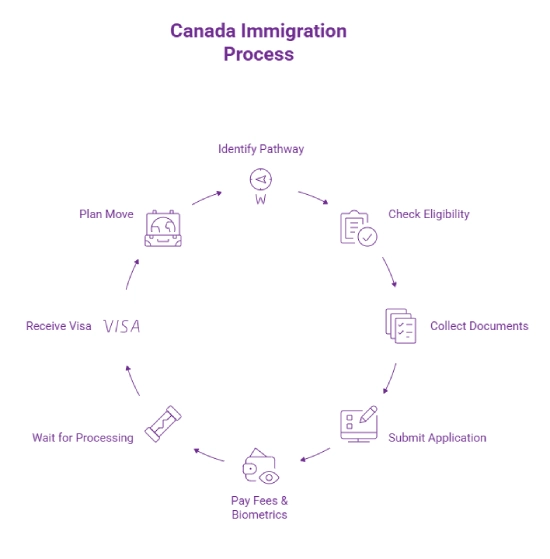While each program to migrate to Canada has different criteria, a few things are in common. Canadian immigration officials will typically assess migration applications based on:
Educational Profile
Professional Profile
IELTS score
French language skills if migrating to Quebec
References & legal documentation
Canadian employment documentation

Canada continues to be a top destination for UK residents seeking permanent settlement through its structured and transparent immigration system. With over 1.4 million new permanent residents expected by 2027, the country offers ample opportunities across healthcare, IT, engineering, and other high-demand sectors. The Canadian PR visa allows individuals to live, work, and study anywhere in the country, access public healthcare, and eventually apply for citizenship.
Canada remains one of the most welcoming countries in the world for immigrants. Under its updated Immigration Levels Plan for 2026- 2028, the Canadian government aims to maintain a balanced and sustainable immigration system that supports economic growth, family reunification, and humanitarian commitments. The focus remains on attracting skilled talent, supporting population growth, and addressing labour market needs across provinces.
The below table gives you an overview of the 2026–2028 Immigration Levels Plan:

Canada offers a wide range of immigration pathways for UK residents, whether you are looking to work, study, reunite with family, or settle permanently.
Below are the major routes through which you can immigrate to Canada from the UK:
.webp)
Express Entry is Canada’s primary immigration system for skilled workers seeking permanent residency. It operates through a points-based Comprehensive Ranking System (CRS) that evaluates candidates on factors like age, education, work experience, and language skills. UK residents can apply directly through one of the following three programs:
*Want to check your eligibility to Canada? Try out the FREE Canada Immigration points calculator to get an instant score!
Step 1: Eligibility check using factors like age, education, language, work history
Step 2: Create an Express Entry profile and receive a CRS score estimate
Step 3: Receive an Invitation to Apply (ITA) if your score meets the draw threshold
Step 4: Submit PR application within 60 days of ITA
Step 5: Undergo medical and police checks
Step 6: Obtain Confirmation of Permanent Residence (COPR) and prepare to move
The Provincial Nominee Program (PNP) is a key pathway for skilled workers, graduates, and entrepreneurs to immigrate to Canada by receiving a nomination from a specific province or territory. Each region operates its own PNP streams aligned with local economic needs and labour market gaps. The Canada PNP program is segregated into two major categories:
The list of Canada PNP programs includes:
The Quebec Skilled Worker Program (QSWP), officially known as the Regular Skilled Worker Program (RSWP), is designed for individuals who wish to move to Quebec permanently for work. This program is ideal for skilled professionals with qualifications and experience that align with Quebec’s labour market needs.
To begin the process, applicants must submit an expression of interest through Quebec’s Arrima Portal. Candidates are then selected based on their ability to integrate into the province’s workforce. Selected individuals receive an invitation to apply for a Quebec Selection Certificate (CSQ), which is required before applying for Canadian permanent residency.
Unlike other immigration programs, QSWP does not require a job offer, though candidates with one are given preference. Quebec manages this program independently of Canada’s federal Express Entry and PNP systems, with its own eligibility criteria and selection process.
*Want to check your eligibility to Quebec? Try out the Y-Axis Quebec Immigration points calculator to get an instant score!
For UK professionals looking to work in Canada, job-based immigration offers several structured pathways that can lead to temporary work permits and eventually permanent residency. These options are particularly beneficial for individuals with job offers or existing employment links to Canadian companies.
| 1,52,171 Invitations Issued in 2025 | |||||||||||||
| Express Entry/ Province Draw | Jan | Feb | March | April | May | June | July | August | September | October | November | December | Total |
| Express Entry | 5821 | 11,601 | 13,261 | 1246 | 2511 | 7,405 | 7,558 | 6,417 | 10,018 | 15,647 | 12991 | 19,522 | 1,13,998 |
| Manitoba | 325 | 117 | 219 | 4 | 118 | 528 | 86 | 114 | 4258 | 891 | 82 | 668 | 7,410 |
| British Columbia | 10 | NA | 13 | NA | 108 | NA | 17 | 16 | NA | 485 | 24 | 432 | 1,105 |
| Ontario | 4 | NA | NA | NA | NA | 3791 | NA | 468 | 4536 | 1680 | NA | 2049 | 12,528 |
| Alberta | NA | 551 | 17 | 246 | 414 | 291 | 433 | 693 | 2819 | 2635 | 1232 | NA | 9,331 |
| Prince Edward Island | 22 | 87 | 124 | NA | 168 | 52 | 39 | 132 | 129 | 319 | 190 | 179 | 1,441 |
| Newfoundland and Labrador | NA | NA | NA | 256 | 733 | NA | 509 | 433 | 570 | 225 | 330 | NA | 3056 |
| New Brunswick | NA | NA | 498 | 477 | NA | 608 | NA | 1052 | NA | 522 | 35 | 110 | 3302 |
| Total | 6,182 | 12,356 | 14,132 | 2,229 | 4,052 | 12,675 | 8,642 | 9,325 | 22,330 | 22,404 | 14,884 | 22,960 | 1,52,171 |
To immigrate to Canada from the UK, applicants must meet specific eligibility criteria based on the immigration program they apply through. The general eligibility criteria for Canada immigration are as follows:
The general requirements for Canada Immigration are as follows:

To be eligible for Canadian immigration under the Federal Skilled Worker Program (FSWP) via Express Entry, applicants must score at least 67 out of 100 points based on six selection factors. These points assess a candidate’s potential to succeed in Canada and include age, education, language proficiency, and more.
Below is a breakdown of the points allocation:
| Factors | Score points |
| Age | Maximum 12 points |
| Education | Maximum 25 points |
| Language Proficiency | Maximum 28 points (English and French) |
| Work Experience | Maximum 15 points |
| Adaptability | Maximum of 10 points |
| Arranged employment | Additional 10 points (not mandatory). |
| Total | 100 points |
| Minimum score required | 67 points |
You can follow the below steps to migrate to Canada:
Step 1: Identify the most suitable immigration pathway based on your profile and goals.
Step 2: Check your eligibility under the selected program, including points, qualifications, and work experience.
Step 3: Collect all necessary documents such as ECA, language test results, proof of funds, and ID proofs.
Step 4: Submit your application through the appropriate portal (e.g., Express Entry, PNP, etc.).
Step 5: Pay the applicable fees and complete biometrics as instructed.
Step 6: Wait for application processing and respond to any additional document requests.
Step 7: Receive your visa decision and Confirmation of Permanent Residence (COPR).
Step 8: Plan your move to Canada.

The list of Canada visas for immigration are as follows:
The table below has details of the average processing time for different types of Canada visas:
| Type of Canada Visa | Processing time of Canada Visa |
| Express Entry | On average, most Express Entry applications are processed within 6 - 27 months of the IRCC receiving them. |
| FSWP via Express Entry Processing time is up to 27 months | |
| FSTP via Express Entry Processing time is up to 49 months | |
| CEC via Express Entry Processing time is up to 19 months | |
| PNPs via Express Entry (online) Processing time is up to 14 months | |
| Canada PR Visa | An applicant will receive a Permanent Resident visa in at least 107 days |
| Canada PR Visa Renewal | The Canada PR visa renewal sometimes might take several months. The general processing time for PR card renewal is around 90 days. |
| Canada Work Visa | Canadian work visa processing has the widest range. It takes at least 14 weeks to process the work visa or work permit. |
| Labor Market Impact Assessment (LMIA) | Depending on the LMIA the applicant chooses, the processing time for LMIA takes 8 – 29 business days to process the application. |
| Student visa | The Canadian study visa or permit gets processed in around 12 weeks |
| Canadian Citizenship | To obtain Canadian Citizenship, it takes at least 24 months. |
| Canada Visitor visa | Canada visitor visa will get processed in a minimum of 164 days |
| Canada Spousal sponsorship (Dependent visa) | The average time Canada Spousal sponsorship processing takes up to 20 months |
| Super Visa | Most of all Super visa applicants in just a few weeks, but usually, it takes around 31 months |
| Post Graduate Work Permit (PGWP) | Canadian PGWP applies after completing studies; the processing time usually takes 2 – 6 months. |
| Start-Up Visa | The processing time usually takes 31 months. |
The table below has complete details of the Canada visa fees:
| Type of Canada Visa | Canada Visa Fee (CAD) |
| Canada PR Visa | 2,500 - 3,000 |
| Canada Work Visa | 155 - 200 |
| Study Visa | 150 |
| Canada Visitor visa | 100 |
| Family Visa | 1080 -1500 |
| Business Visa | 1,625 |
Canada is a top choice for UK residents seeking a fresh start in a vibrant and inclusive society. With its high standard of living, free universal healthcare, and world-class education system, Canada offers a quality of life that appeals to families and professionals alike. Immigrants enjoy excellent career prospects, affordable housing in many provinces, and a strong sense of community in a safe, multicultural environment. Moving to Canada means embracing a balanced lifestyle surrounded by breath-taking natural beauty and endless opportunities for growth.
Y-Axis is the leading immigration consultant for individuals looking to migrate to Canada. Our end-to-end support with the immigration process ensures that you make the right decision at every step. We guide you with:
Explore what Global Citizens have to say about Y-Axis in shaping their future
Canada Immigration Process
Y-Axis Client Mr.Rahul Patel Reviews tha
Read More...
Canada PR Process
My formative school years were in the ve
Read More...
Canada Immigration Services
Y-Axis Client Mr.Vikas shares the feedba
Read More...
To immigrate to Canada, you must meet specific requirements based on the program you apply for. The general requirements include:
For Express Entry (Federal Skilled Worker or Trades), proof of funds is mandatory unless you have a valid Canadian job offer or are applying under the Canadian Experience Class. As of July 2025, funds required range from CAD 15,263 for a single applicant to CAD 40,392 for a family of seven.
The table below has complete details of the proof of funds required based on the number of family members:
| Number of family members | Proof of funds | |
| 1 | $15,263 | |
| 2 | $19,001 | |
| 3 | $23,360 | |
| 4 | $28,362 | |
| 5 | $32,168 | |
| 6 | $36,280 | |
| 7 | $40,392 | |
| If more than 7 people, for each additional family member | $4,112 |
Canada offers multiple pathways for individuals to settle permanently, depending on their skills, family ties, or provincial needs.
In Canada, certain family members who are citizens or permanent residents can sponsor you for permanent residency under the Family Sponsorship Program. Eligible sponsors include:
Eligibility for Canada Permanent Residency (PR) depends on the immigration program you apply under, but most programs share common criteria. To qualify, you typically need to:
There is no strict age limit to immigrate to Canada. However, age is an important factor in Canada’s points-based immigration system, such as Express Entry. Applicants between the ages of 18 and 35 receive the highest points for age under the Comprehensive Ranking System (CRS). After 35, points for age gradually decrease, and individuals over 45 receive no points for age.
Yes, an IELTS score is mandatory for most Canada immigration programs if English is your primary language. The Immigration, Refugees and Citizenship Canada (IRCC) requires applicants to demonstrate language proficiency in either English or French as part of the eligibility criteria.
For English, the IELTS General Training test is one of the approved tests accepted by IRCC. The required score depends on the program:
For French-speaking applicants, approved tests like TEF or TCF can also be used to meet language requirements. Strong language scores not only fulfill eligibility but also significantly boost your ranking in the Express Entry pool.
To move to Canada permanently, you must apply for permanent residency (PR) through one of the country’s immigration programs. The most common pathways include:
Once approved, you will receive a Confirmation of Permanent Residence (COPR) and can begin your new life in Canada. Each pathway has specific eligibility criteria, so it’s important to choose the one that best matches your profile.
To qualify for Canada’s Express Entry system, you need at least 67 points out of 100 on selection factors like age, education, work experience, and language skills. Once in the Express Entry pool, your profile is ranked using the Comprehensive Ranking System (CRS). While there is no fixed CRS cut-off, higher scores improve your chances of receiving an invitation to apply for permanent residency.
The amount of money you need depends on your family size and the immigration program you apply under. For Express Entry, you must show proof of funds unless you have a valid job offer or are applying under the Canadian Experience Class. As of 2025, a single applicant needs approximately CAD 15,263, while a family of four requires about CAD 28,362. This ensures you can support yourself and your family after arriving in Canada.
UK residents can immigrate to Canada through several streamlined pathways that do not always require a job offer or Canadian work experience. Some of the most accessible options include:
Note: These pathways are designed to make the immigration process faster and more accessible for qualified UK residents.
Yes, it is possible to immigrate to Canada from the UK without a job offer. Programs like the Federal Skilled Worker Program under the Express Entry system assess applicants based on factors such as age, education, work experience, and language proficiency—no job offer required. If you score competitively in the Comprehensive Ranking System (CRS), you can receive an Invitation to Apply (ITA) for permanent residence. However, having a job offer or a provincial nomination can improve your chances and speed up the process.
The CRS is a points-based system used to evaluate candidates under Canada’s Express Entry programs. Points are awarded for age, education, language skills (IELTS or CELPIP), work experience, and adaptability. The total score determines your ranking in the Express Entry pool. Regular draws are held to invite top-ranking candidates to apply for permanent residence. A provincial nomination adds 600 points, significantly boosting your chances of receiving an invitation.
Yes, UK nationals aged 18–35 can take part in the International Experience Canada (IEC) program. Through the Working Holiday or Young Professionals stream, you can live and work in Canada for up to two years. This program offers an excellent opportunity to gain Canadian work experience, explore the country, and build a pathway toward permanent residence through Express Entry or provincial nomination programs.
Permanent residents in Canada are eligible for public health care through provincial or territorial insurance plans. However, some provinces impose a waiting period—up to 90 days—before coverage begins. During this period, it is advisable to obtain private health insurance. Once enrolled, you’ll have access to medically necessary services, but dental, vision, and prescription drugs may require additional private coverage.
The Express Entry system is typically the fastest route for skilled workers from the UK. If you qualify for programs like the Federal Skilled Worker Program or Canadian Experience Class and have a competitive CRS score, you may receive an Invitation to Apply within a few weeks. Once you submit your complete application, the processing time is usually around six months. Provincial Nominee Programs (PNPs) aligned with Express Entry can also fast-track your application.
Processing times depend on the immigration pathway chosen. For Express Entry, once a complete application is submitted, it usually takes around six months to receive a decision. If applying through a Provincial Nominee Program or with a Labour Market Impact Assessment (LMIA), timelines may extend to 9–12 months. IEC permits are generally processed within 2–6 weeks. Factors such as document accuracy and biometrics also influence processing time.
To check your eligibility, you can use the official “Come to Canada” tool on the Government of Canada website. It evaluates your profile based on key factors such as age, education, work experience, and language proficiency. You may also create an Express Entry profile to calculate your Comprehensive Ranking System (CRS) score. Depending on your score and profile, you can explore programs such as Express Entry, Provincial Nominee Programs (PNPs), Family Sponsorship, or Business Immigration.
At Y-Axis, we simplify this process by offering a free eligibility assessment, expert profile evaluation, and personalized migration planning. Our experienced consultants guide you in selecting the most suitable pathway and support you through every step of your Canada immigration journey—from documentation to visa filing
You can follow the below steps to open a bank account after moving to Canada from the UK:
Step 1: Gather your documents (usually a valid passport, Canadian visa or work permit, and proof of address such as a lease agreement or utility bill)
Step 2: Apply for a Social Insurance Number (SIN) if you plan to open an account that earns interest or apply for credit, as banks may request it.
Step 3: Research and compare newcomer banking packages offered by major Canadian banks. These often include no-fee chequing accounts, credit cards, and settlement support.
Step 4: Visit a local branch in person (many require this for newcomers) and submit your documents.
Step 5: Once approved, your account is opened, and you can start using your Canadian debit card and online banking services immediately.